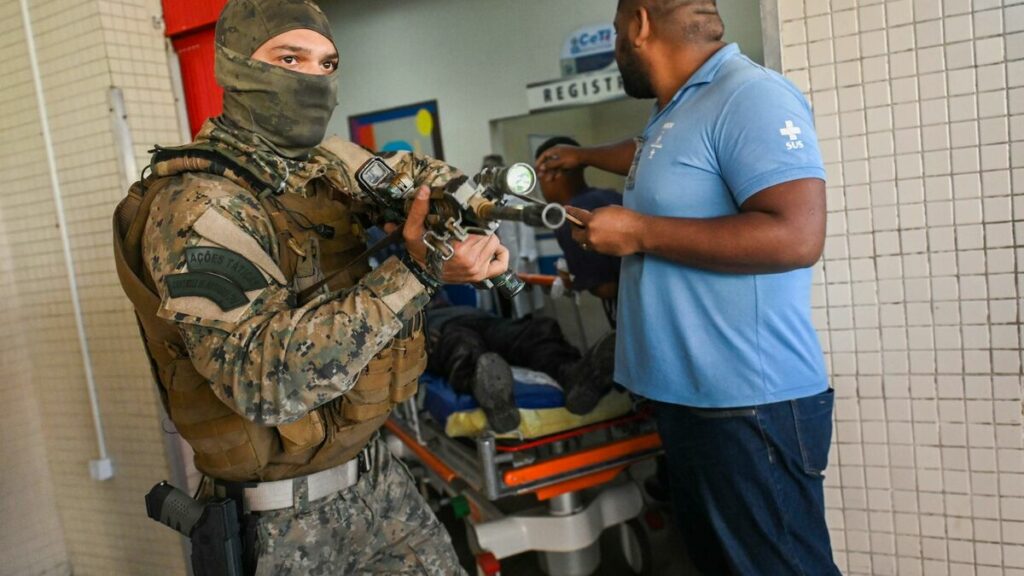The Batalhão de Operações Policiais Especiais or BOPE has just made people talk about it in Rio. This elite military police task force from the state of Rio never does anything and sadly proved it again this Tuesday in Brazil. A muscular police operation once again ended in bloodshed in a favela north of Rio de Janeiro, killing at least 22 people, ten suspects and a resident killed by a stray bullet on Tuesday, a year after the raid by security forces. the deadliest order in the city’s history. Ten new bodies were found later in the day without it being known whether these victims were among the suspects. Police said at least 11 victims were « suspects » and a favela resident was hit by a stray bullet.
“Another massacre. We cannot trivialize this, it is not possible for the state to enter a favela and leave more than 20 corpses, ”said David Gomes Lobo dos Santos, 32-year-old resident of Vila Cruzeiro, to AFP. « It was an operation planned for weeks, but we identified movements of criminals during the night and we decided to intervene », explained Colonel Luiz Henrique Marinho Pires, who specified that the suspects were preparing to flee to another favela.
The military police, who frequently carry out this kind of morning operations in the favelas of Rio against drug traffickers, claim to have been greeted by gunfire as they began an operation intended to « locate and capture criminals hidden in the favela » of Vila Cruzeiro.
He also revealed that a helicopter used by the police during the operation had been hit by several bullets. The operation, which began around 4:00 a.m. (7:00 GMT) on Tuesday, particularly targeted the « Comando Vermelho » (red commando), one of Brazil’s main criminal factions « responsible for more than 80% of the shootings in Rio », a police spokesman told TV Globo.
21 dead and no arrests
A 41-year-old woman hit by a stray bullet died instantly. Many anguished families were waiting for news outside a hospital, fearing that someone close to them was among the killed. Three people were injured, two residents and a policeman. Around noon sounds of explosions and bursts of bullets were still heard around the favela.
Thirteen assault rifles, four pistols, twenty motorcycles and ten cars were seized during the operation, but the police did not report any arrests. The most intense shooting took place in the upper part of the favela, on top of a hill where the rainforest is blocked off with a dirt road. In 2010, images of dozens of armed individuals fleeing down this dirt road in the middle of the day during a large-scale police operation went around the world.
Vila Cruzeiro, a favela not far from Rio’s international airport, had already been the scene of another violent clash in February, when eight people were killed by security forces. In May 2021, a police operation in the Jacarezinho favela, about 10 km from Vila Cruzeiro, left 28 dead, including a policeman, the heaviest toll in the city’s history.
– No cameras on uniforms –
“Another massacre. Schools closed, thousands of people terrorized. It is the failure of all plans to reduce (police violence), the policy of extermination is taking its course in Rio, ”tweeted left-wing city councilor Tarcisio Motta.
During these muscular operations of the military police of Rio, residents and activists of associations often denounce blunders or extrajudicial executions of suspects, abuses most of the time unpunished.
6,100 deaths in 2021, or 17 per day on average
“These operations in the favelas endanger the entire population and prevent the functioning of public services. We know that they would never be tolerated in chic neighborhoods, ”explains Guilherme Pimentel, public defense auditor, who provides legal assistance to the poorest, to AFP.
The Brazilian police are one of those who kill the most in the world, with more than 6,100 deaths in 2021, or 17 per day on average. Police officers in Rio were supposed to wear body cameras on their uniforms starting this May, but the use of the equipment has been postponed due to delivery delays, according to local press.
In the neighboring state of Sao Paulo, the number of violent episodes involving police officers has fallen by 87% since the use of cameras, which has become widespread since 2021. Beyond the use of cameras, experts in security advocate the abandonment of the logic of permanent confrontation in the fight against drug trafficking, to attack instead the financial resources of the criminal factions.

